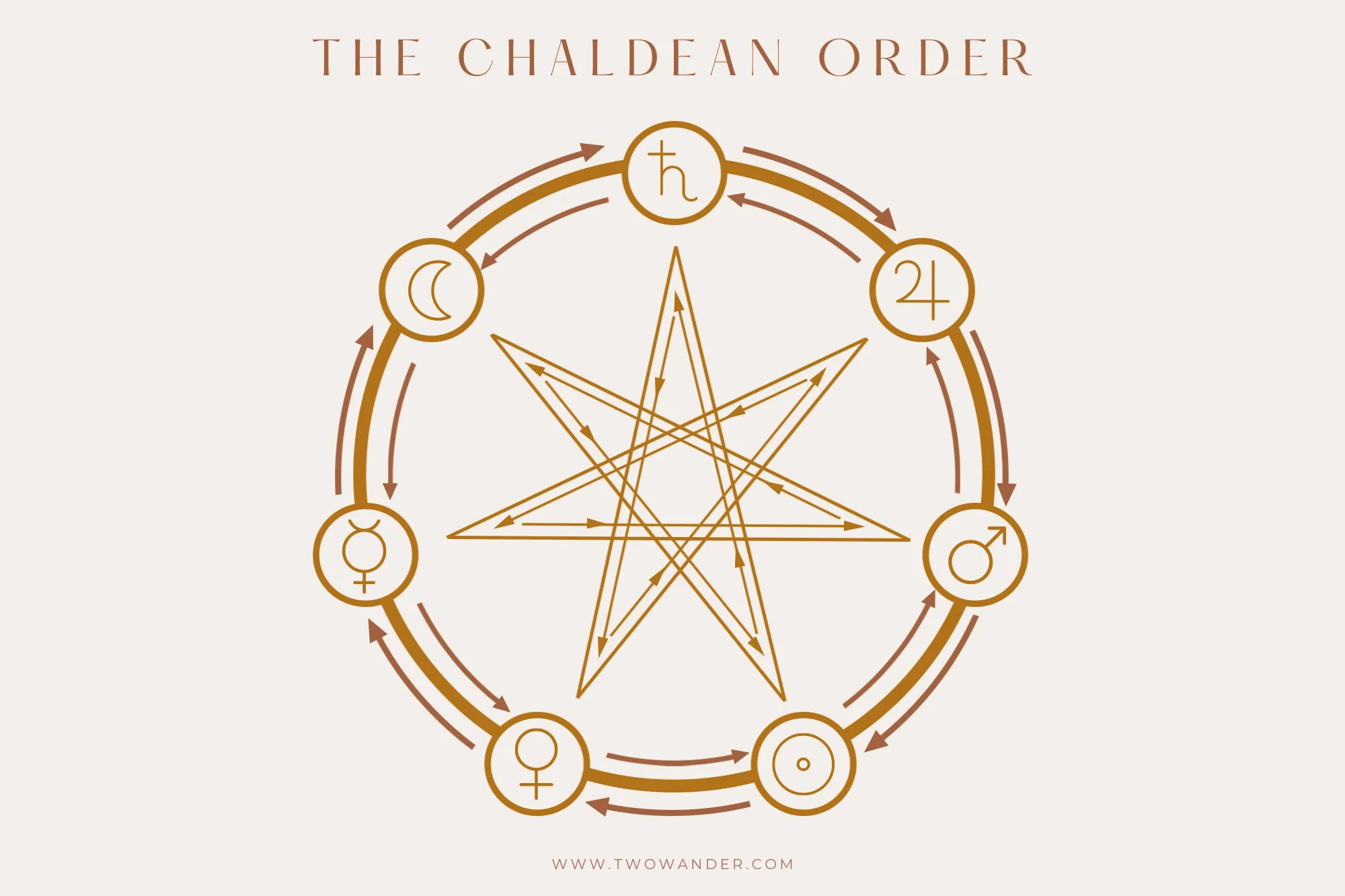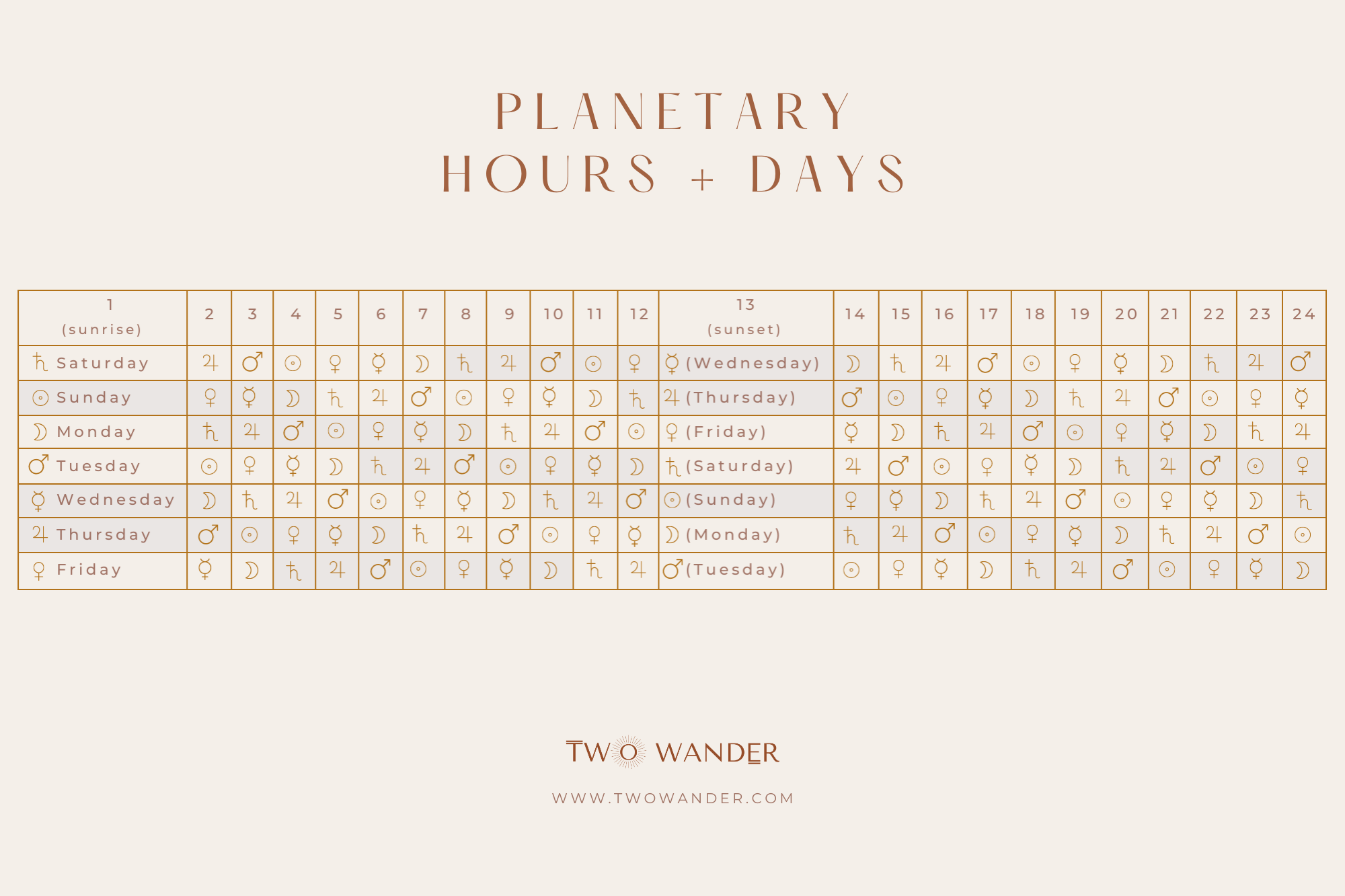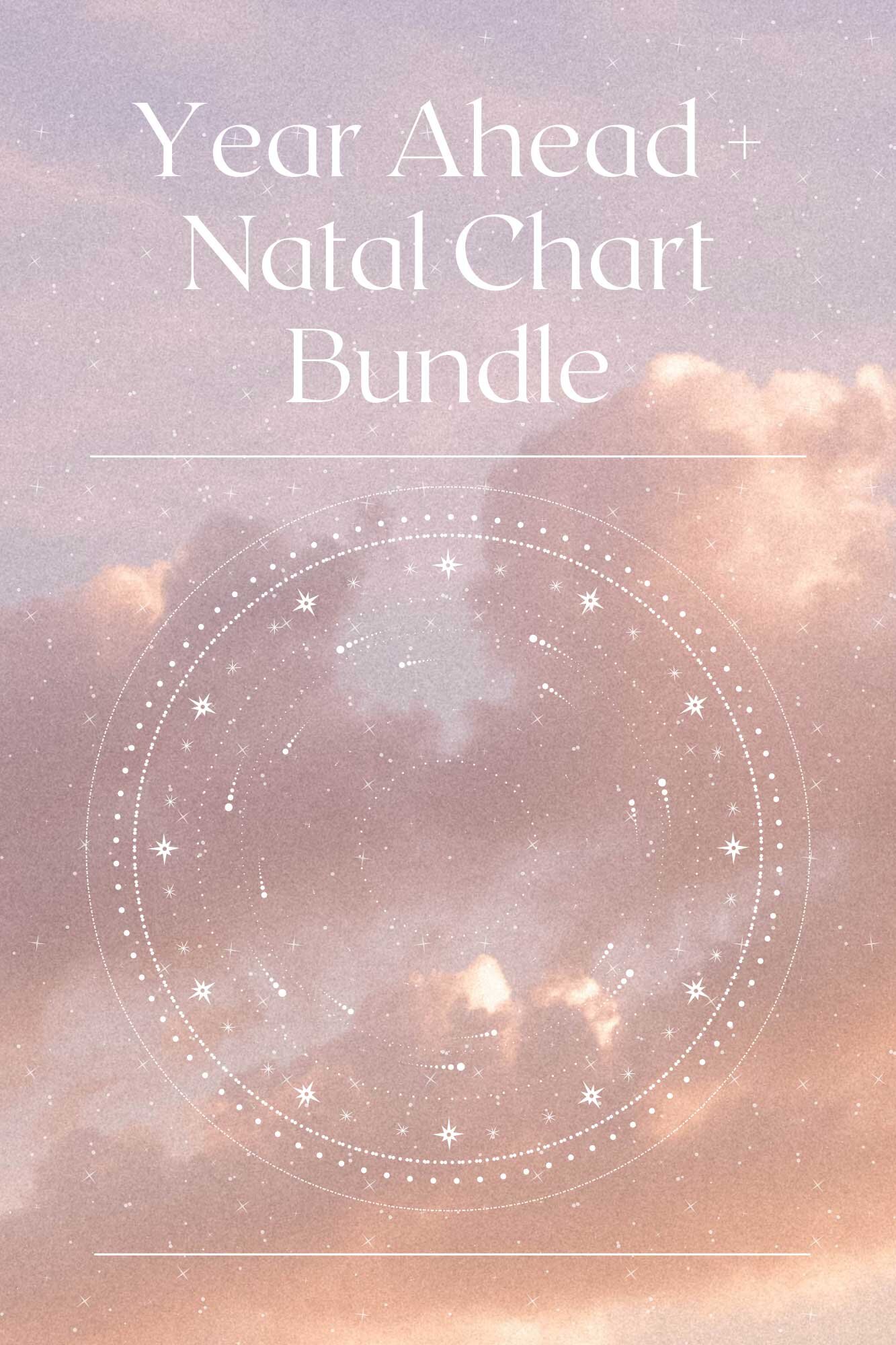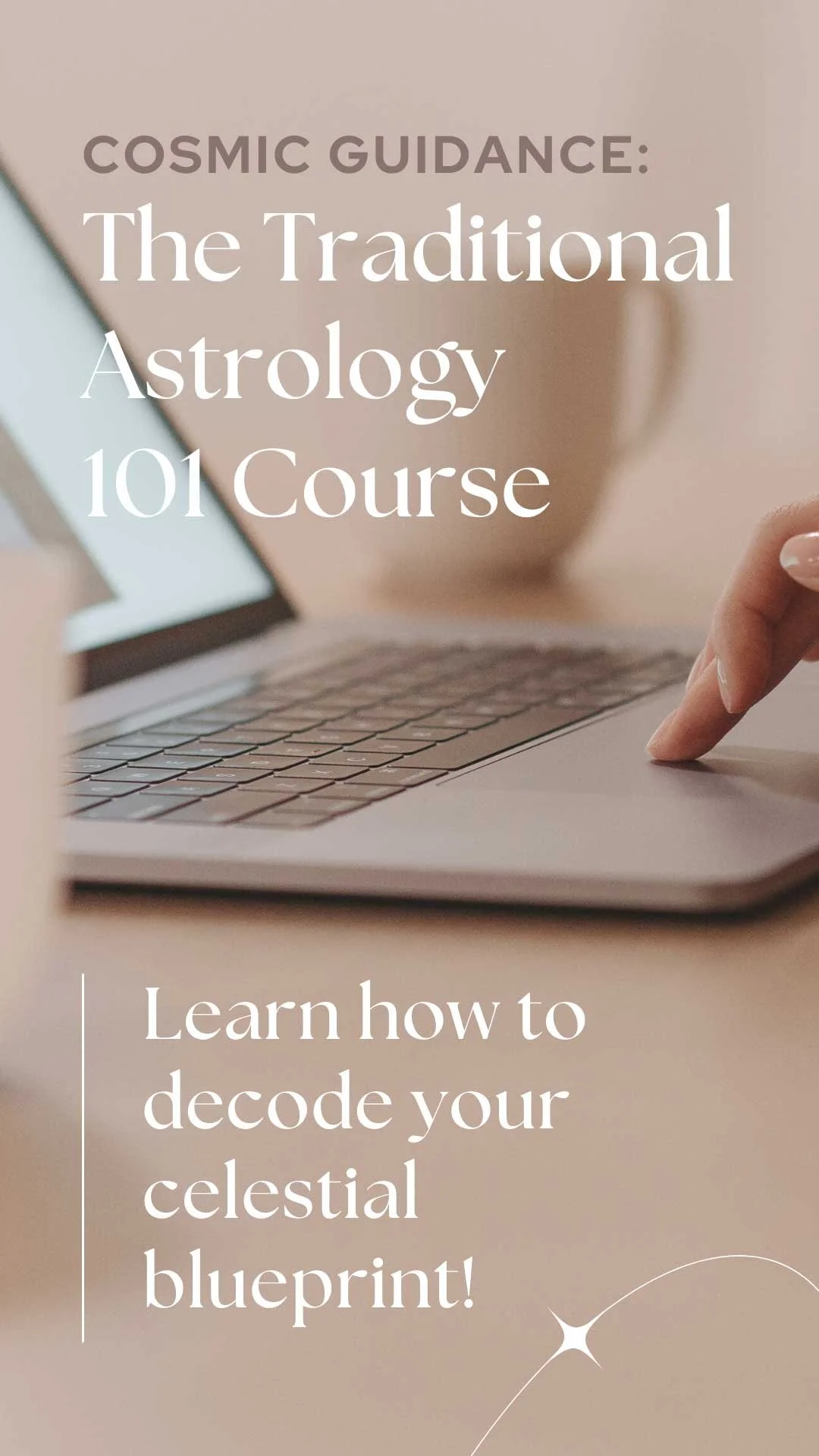Chaldean Numerology And Planetary Hours
This post may contain affiliate links. If you choose to purchase through these links, we may receive a small commission at no extra cost to you. By using these links you are directly supporting us to continue creating Mystical Musings. Thank you!
Chaldean Order Numerology And Planetary Hours
Numerology has been used for thousands of years by multiple civilisations to help explain and predict certain phenomena of the Universe. It is said that each number holds its own energetic frequency and meaning, and by using different methods of calculation, you can figure out explanations for a variety of things.
There is a distinction between Numerology and Chaldean Numerology in that the former is based on Pythagoras’ observations, and the latter is based on the studies of the Babylonians. Usually, Numerology is used to calculate things like your Life Path number and Destiny number, whereas the Chaldean Order is ascribed to other esoteric systems such as Astrology and Tarot, although Chaldean Numerology can also be used to calculate a type of Life Path number.
The Chaldean Order
The Chaldean Order indicates the relative orbital velocity of the Planets from our vantage point on Earth. From a heliocentric perspective it also shows the relative distance of the Planets from the centre of their orbits, i.e. the distance of the Planets from the Sun (with the Sun switching places with the Earth) and the distance of the Moon from the Earth. From a traditional geocentric perspective, the Chaldean Order also shows the arrangement of the Planetary spheres.
The sequence is from slowest to fastest moving as the Planets appear in the sky (that were visible with the naked eye at the time of its creation about 5000 years ago, also known as the classical Planets), which are the Sun and Moon, Mercury, Mars, Venus, Saturn, and Jupiter.
The Planet order, known as the Chaldean Order, goes: Saturn - Jupiter - Mars - Sun - Venus - Mercury - Moon. Each Planet is said to have different characteristics and is assigned a specific day of the week, from there the Planetary hours are calculated. Read on to find out how it’s done:
Numerology
In the commonly used Pythagorean Numerology system, your full date of birth, e.g. 6/11/1989, is added up until it reaches a single digit from any compound numbers above 10 (unless it is 11, 22, or 33 which are considered “master numbers” with their own properties and so not reduced).
For example, with the date above we get 6 + 1 + 1 + 1 + 9 + 8 + 9 = 35, which will then reduce to 3 + 5 = 8. This would be your Life Path Number.
There is also a system attached to letters to find out your Destiny (or Expression) Number using your name, this is as follows:
1 = A, J, S
2 = B, K, T
3 = C, L, U
4 = D, M, V
5 = E, N, W
6 = F, O, X
7 = G, P, Y
8 = H, Q, Z
9 = I, R
So for example, if your name is Sam Smith, your Destiny Number would be 1 + 1 + 4 + 1 + 4 + 9 + 2 + 8 = 30 which reduces to 3 + 0 = 3. It is usually advised to use your full name and last name on your birth certificate, but you can try working out your nickname or just your first name as these are also said to have different connotations.
If you have had a legal name change, you can use that too, and perhaps check out if there are any differences with your birth name. There are also other numbers calculated using only the vowels in your name (for your Soul Urge/Heart’s Destiny Number) and consonants (for your Personality Number) as these are said to vibrationally represent different things psychologically, and how we present ourselves in the world and are received in return.
In the Chaldean system, the number 9 is considered sacred for its connection to infinity and so is not used, the letters are also assigned slightly different numerical values, they are as follows:
Chaldean Numerology Chart
1 = A, I, J, Q, Y
2 = B, K, R
3 = C, G, L, S
4 = D, M, T
5 = E, H, N, X
6 = U, V, W
7 = O, Z
8 = F, P
So for example, again, if your name was Sam Smith, in Chaldean Numerology your Destiny Number would be 3 + 1 + 4 + 3 + 4 + 1 + 4 + 5 = 25, and then 2 + 5 = 7.
Number meanings:
Number 1 - The Leader: Ones are natural-born leaders, they are ambitious and usually successful in the professional world. They are charming, diplomatic, and always interesting to be around. They may be caring to the point of becoming overprotective and domineering, and may also be prone to anger issues.
Number 2 - The Mediator: These people are deeply kind, caring, and empathetic. They are often artists or creatives, though their skill for diffusing tense situations and diplomacy may also make them successful as politicians. A deep sensitivity and conflict aversion can make 2s overly dependent in their personal relationships and may have a hard time standing up for their needs.
Number 3 - The Communicator: Threes are said to love attention and company, and generally come by it easily. They can achieve a great many things, have high energy, and are skilled orators, communicators, story-tellers, and thinkers. They may have difficulty in focussing or committing for the longterm and finishing any exciting projects they start with the same enthusiasm, they may also become too focused on others’ perceptions of them.
Number 4 - The Worker: This is generally a hard-working, reliable person, which makes them a desirable friend and co-worker. You generally know what to expect from a four as they are self-disciplined and helpful, but can become too rigid, stubborn, and narrow-minded. They may find themselves easily frustrated by people who create their own guidelines or stray too far outside the “rules”.
Number 5 - The Freedom Seeker: Fives are inquisitive and intellectual, often making for great journalists and educators. They have good communication skills with a childlike sense of joy for life and learning. They may find themselves indulging a little too much in their favourite hobbies/vices or come off as superficial and noncommittal in relationships.
Number 6 - The Nurturer: This person is a loving carer and can also be an impassioned speaker and activist, whether professionally or personally, on behalf of their loved ones or things they care about. Their curiosity and compassion make them great therapists. They may struggle with possessiveness, assertion, caring for themselves stubbornness, jealousy, or superficiality.
Number 7 - The Seeker: These are deeply creative with a strong and vivid imagination, comfortable exploring their internal world. They are able to entertain themselves for hours and are rarely bored. They may be a bit shy and have a hard time connecting with other people. They may also have a hard time relaxing, moving constantly between work and “constructive” hobbies.
Number 8 - The Powerhouse: These are the managers, they are strong, organised and good with money. They are ambitious and successful, willing to work hard to be self-sufficient and comfortable. They may become to narrow-minded, forceful in their manner, or workaholics.
Number 9 - The Humanitarian: Nines are idealistic and deeply principled, unwilling to compromise their values. They are agreeable, generous, and tolerant, as such they make great teachers (whether by profession or otherwise). They may be prone to moodiness and risk codependency in personal relationships, and may have trouble enjoying the present rather than focusing too much on their dreams for the future.
Number 11 (2) - The Giver: Master Number 11 is an innovator with a streak of humanitarianism, they have the elements of the number 2 as well as idealism, intuition, and tolerance. If expressed negatively they may become too dependent, overly sensitive, or manipulative.
Number 22 (4) - The Master Builder: Although Master Number 22s are idealists and visionaries, they are also grounded and pragmatic. Again, with all the qualities of the 4s, they are also known as the achievers, wise, resourceful, and passionate. If expressed negatively they may become overly emotional, destructive, or dramatic.
Number 33 (6) - The Healer: Number 33 is said to be the most influential of the Master Numbers and strongly resonates with the energies of honesty, compassion, inspiration, courage, and good fortune. They have high levels of sincere devotion to whatever cause they dedicate themselves too but may also lose themselves in it.
Some similarities can be seen in the order of the Astrological Zodiac Signs. For example, Aries is the first Sign of the cycle and also known as a natural-born leader; similarities can also been seen in Gemini, the third Sign of the Zodiac; Leo, number 5, and Scorpio, number 8.
This is also visible in Tarot where the sixes often tell us of harmony, nurturing, and contentment, as well as in the 1s, 4s, and 7s. You can also use this method of reducing your birth date to single digits to find your representative Major Arcana Tarot card.
In the case of my birth date, this would be the number 8, and so equivalent to the Strength card. The same can be applied to the current year, for example 2021 is a 5 year (2 + 0 + 2 + 1) which is the Hierophant card, read more about the meaning of that as well as the link between Tarot and Numerology here!
To make things a little easier, you can also simply use a Chaldean Numerology calculator online, such as this one.
Planetary Hours
Used in agriculture for thousands of years, as well as in magic, spell, and ritual work, along with the Moon calendar, Planetary hours are a great way to go even deeper and more specific into the influence of a day. People often use them to schedule important dates such as weddings, or to retroactively understand an element, such as with a birth time which will add another layer to your Birth Chart. It can sometimes be quite time consuming to calculate the Planetary hours on your own so it is often easier to use a Planetary hours calculator, such as this one.
In order to calculate Planetary hours, you must first be familiar with the ruling Planet for each day of the week. In general, the Sun is said to represent our self-expression and creativity; the Moon represents our emotions and needs; Mercury represents our communication and thinking; Venus represents love, money, and our values; Mars represents action and ambition; Jupiter represents wisdom and beliefs; and Saturn represents ethics and responsibilities.
Each day of the week is traditionally associated with a ruling Planet, which will be easier for you to instinctively know if you speak one of the Romance languages. For example, in Italian, Tuesday is martedi (we don’t capitalise the days of the week) and Mars is called Marte, Wednesday is mercoledi and Mercury is Mercurio, and so on. If not, you will simply have to memorise them, here is an overview:
In Astrology, the Moon is said to rule Monday, Tuesday is ruled by Mars, Mercury rules Wednesday, Thursday is ruled by Jupiter, Venus rules Friday, Saturn rules Saturday, and the Sun rules Sunday, of course.
Whichever Planet rules the day of the week will rule the "hour" beginning at sunrise of that day, and then the rest of the Planetary hours will cycle through in order until the following day's sunrise, where it will begin again with the next day's ruling Planet. You can easily reference this by going around the edge of the circle in the image above.
Planetary Days of the Week
MONDAY = MOON - The Moon is intuitive and considered nocturnal (obviously), so is said to deal with change, emotions, instinct, travel, anything involving women, and lunar cycles. We can kind of see the connection between Monday and the Moon here in English. Things like cooking, cleaning, food shopping, and intuitive activities can be beneficial.
TUESDAY = MARS - Mars is traditionally action-oriented so deals with enthusiasm, energy, passion, competition, and anything requiring determination. It is a good day for doing driven things that require grit.
WEDNESDAY = MERCURY - Mercury is our expression and thought patterns so deals with technology, education, travel, thinking, communication, as well as siblings, and friendship. It is a good day for education, teaching, and socialising.
THURSDAY = JUPITER - Jupiter is known for its growth and expansion so things will generally increase, whether that be positive or negative, but is also associated with good luck, fortune, wisdom, long distance travel, and spirituality. It is a good day for spiritual work, teaching, or things relating to money or fun.
FRIDAY = VENUS - The perfect date-night! Venus is associated with love, luxury, beauty, romance, pleasure, and purchases. It is a good day to schedule aesthetic appointments or do design work.
SATURDAY = SATURN - Saturn is known for its responsibility and longevity, so is good for long-term planning, career issues, dealing with institutions (such as prisons, hospitals, marriage etc.), investments, and ancestral work. Again, there is a similarity between Saturday and Saturn in English. It is a good day for dedication and devotion, such as spiritual work, cleaning, or rituals.
SUNDAY = SUN - Sunday is known as the day of vibrancy, success, happiness, and an all-purpose day. This is the most obviously correlated day in English with Sun and Sunday. It is a good day for doing things that light you up and are characteristically related to you.
Then, to calculate the Planetary hours of each day, we begin at sunrise and take the number of minutes between sunrise and sunset for that particular day and divide it by 12, to get how many minutes each "hour" of that day will be. You would then do the same for the sunset to sunrise hours. This means that the length of each Planetary hour will differ from day to day, depending on the time of sunrise and sunset of the time period you are looking at.
For example, if sunrise is at 6:21am and sunset is at 7:50pm of a day I’m interested in figuring out the Planetary hours for, it means that that “day” lasts 13 hours and 29 minutes, so each Planetary “hour” lasts 67 minutes (13 hours x 60 minutes = 780 + 29 minutes = 809 total minutes for the “day”, divided by 12 = 67 minutes). This means that the first hour and 7 minutes of the day after 6:21am (until 7:28am) is ruled by the Planet of that day. If it were Monday, it would be ruled by the Moon, then from 7:28am until 8:35am would be ruled by Saturn and so on. You can see a summary of this in the image below.
Planetary Hours
Each hour is largely said to be optimal for things related to the characteristics of the Planetary day, such as:
Hour of the Sun - Good for making presentations, public speaking, things related to social status, dealing with authority, being seen
Hour of the Moon - Good for things that are likely to change or are not intended to be permanent, for increased intuition, imagination, family, food, and creativity
Hour of Mercury - Good for logical thinking, mental alertness, speaking, signing documents, sending important mail, fixing tech problems, socialising
Hour of Venus - Optimal for social occasions, love, romance, marriage, beauty, financial matters, or to reconcile conflicts
Hour of Mars - Good for activities that require exertion, boldness, courage and action (beware that Mars can also be confrontational!)
Hour of Jupiter - Jupiter hours are optimal for good luck or growth in any activity, including spiritual work, teaching, or generally being well-received
Hour of Saturn - Good for organisation, breaking unwanted habits, dealing with responsibilities, and contemplation/meditation, long-term planning, rituals
Here are some ideas for how to use Planetary hours, that is not related to gardening or magic work, in which case you would normally pick a Planet day and Planet time based on your intentions:
You could learn a new computer program or plan to fix a tech issue in the hour of Mercury
Do creative or intuitive work in the hour of the Moon, or anything to do with people identifying as women
You could schedule your haircut or facial in the hour of Venus
Plan to do a workout in the hour of Mars, or something that requires courage of you
Manifestation work or asking for a favour in the hour of Jupiter
Ask for a raise during or make a presentation in the hour of the Sun
Sign an important contract in the hour of Mercury
Meet with a friend in the hour of Venus to heal a disagreement
Launch a new business in the hour of Jupiter
Do your taxes in the hour of Saturn or longterm planning for your future
The list and options available to you is really endless! Check out our Complete Astrology Guidebook to learn more about the characteristics of each Planet for more information. Here is a table below with a summary of the Planetary hours and days for your reference:
So that’s the Chaldean Order and Numerology and how to figure out the Planetary hours to give a boost to your day-to-day activities. I hope it’s of some use to you- have you ever aligned your actions with the Planets before? I’d love to hear about your experience in the comments section below!
To learn more about how Numerology ties in with the mystical world of Tarot, check out our Tarot Guidebook For Heightened Intuition! If you would like to take a deeper dive into Astrology then check out our Cosmic Guidance: Astrology 101 Course or our Beginner’s Astrology Guidebook!
Or, if you’d like a personalised star map to your cosmic blueprint, book yourself in for a Natal Chart reading with me and let’s uncover what the heavens have to say for you!


























